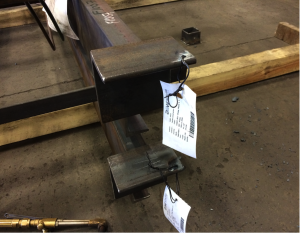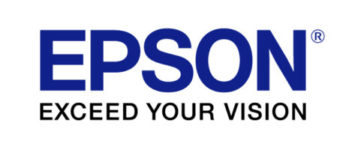
Case Study
Identifying Industrial Manufacturing Equipment With Non-Rip Thermal Printer Tags

Altaland Steelworks Inc. in Edmonton, Alberta offers steel fabrication, manufacturing, and field services across a variety of industrial sectors.
When NMS’ Andrew Koziol visited Piotr and Jordan of Altaland Steelworks, they discussed the labeling problem they were experiencing. The steel parts that are manufactured at their location require painting and engineering specifications attached to each part. They were using paint pens to write the engineering specifications (part number, job number, date, paint spec and any other job specific information). When the parts are delivered to the work site the installers require this engineering information. If the hand written information is not visible then the installers are wasting time contacting the office for verification on the data.
Altaland looked at using a metal tag to clip on to their parts. They would print the information on the inside of the metal tag, fold the tag in half, attach the tag to the part then prime and paint the part. When the tag was unfolded the text would be visible and hopefully readable. As an alternative, Neumann marking Solutions suggested using a Polyethylene Tear Resistant Tag instead of a more expensive metal tag. The Polyethylene Tear Resistant Tag is a synthetic non-rip material, much like ski lift tags. These industrial thermal transfer labels are very cost effective and can be printed using the thermal printer and then folded in half prior to the painting process. For this application, the tags have a hole punched in them, which allows easy attachment with a plastic tie wrap to the manufactured parts.
Samples were prepared, shown and accepted. However, when the job was to be printed on the customers’ existing Kroy K4350 printer, it was discovered that the Kroy label length sensor is permanently fixed in the center of the printer mouth. Therefore, when the label material was fed through, the sensor read the tie wrap hole as a gap causing the printer to become confused. As the sensor could not be moved to a different location, we determined this material could not be used with their existing Kroy printer.
Jordan required 700 tags to be printed with engineering specifications. To assist Jordan, NMS loaned him a TSC TTP-247 desktop industrial printer (this model has since been replaced by the TSC TTP-345). This thermal printer has a sensor that can be moved off center. The sensor was moved to avoid reading the hole, the job was sent and all 700 of the tags were printed with no issues solving Altaland Steelwork’s problem.
These tags were a trial to verify if this new material and printing method will be something they will continue to use in the future. The trial was a great success!
Working with Altaland Steelworks, NMS analyzed the labeling problem and offered a solution. A new, low cost, durable labeling material was introduced, used in a trial, and accepted. A new thermal printer with greater flexibility and faster print speed was introduced, used and accepted. The recommended solution allowed Altaland Steelworks to solve their identification challenge, while reducing costs and increasing productivity.

Learn more about the TSC TTP-345 Label Printer with Cutter Kit.
Learn more about the NMS Polyethylene Tear Resistant Continuous Tags.
If you have an industrial identification labeling issue you are trying to solve, give our labeling and marking experts a call at 780-434-9152 or TOLL FREE at 1-800-268-7636. The team at Neumann Marking Solutions has been serving the industrial identification needs of the industrial Canadian market for over 25 years and are dedicated to providing excellent customer service and solutions.








 Help Desk Service – Contact us Between the Hours of 7:30 – 4:00 (MST)
Help Desk Service – Contact us Between the Hours of 7:30 – 4:00 (MST)